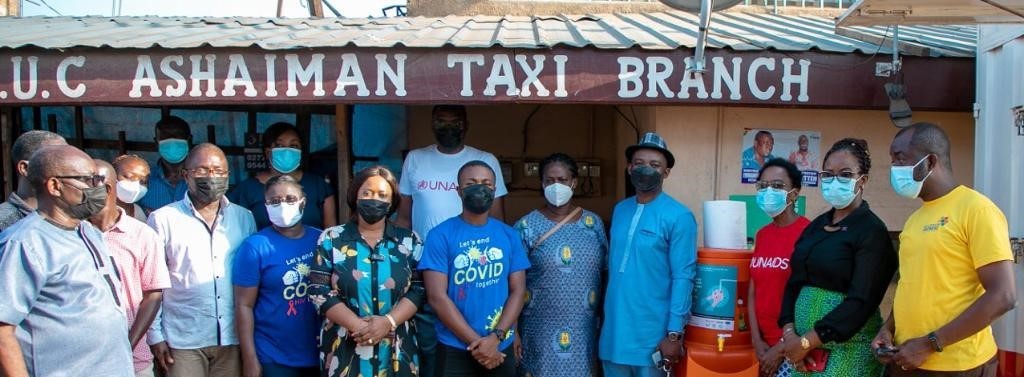
Covid & Cities Blog – 5th in the Series: Even in a pandemic, health is political as well as technical: Alleviating the burden of COVID-19 on vulnerable urban populations in Ghana
Lauren J. Wallace & Ivy Akushika Agbenu
Image shows COVID-19 Sensitization at a Taxi Station in Ashaiman Municipality, Greater Accra, jointly led by the Municipal Health Management Team and Development Partners
Background
The COVID-19 pandemic has once again brought renewed attention to the importance of understanding how politics shapes responses to health challenges. Government decisions and their implementation get influenced by both ‘Big P’ politics such as international power dynamics and national context and ‘small p’ politics or ‘micro politics’ (contextual realities such as beliefs, norms, and local structural constraints)[i]
Governments in many countries have made decisions to minimize the impacts of COVID-19 on social and economic life alongside a focus on reducing the incidence, and mortality of the pandemic. The Government of Ghana took such a holistic approach. ‘Minimizing the impact of COVID-19 on social and economic life” is one of the six strategic objectives of Ghana’s National COVID-19 Response Plan.[ii] What have been the decisions and the interventions to implement these decisions that national and local governments in Ghana have put in place to minimize the social and economic impacts of COVID-19? What has been the role of politics in decision making and implementation? What has been the effect of all of this on the social and economic wellbeing of vulnerable urban populations?
In this blog we draw on a desk review of official documents and media reports published from March 2020 to September 2020 and twenty-three (23) in-depth interviews conducted in February and March of 2021 to answer these questions. Documents and media were sourced from Factiva, Google and organisational websites. In-depth interview respondents were from municipal health management teams and municipal assemblies involved in key areas of the COVID-19 response.
Who are the most socioeconomically vulnerable in terms of COVID-19?
Existing inequities such as between North and South, formal and informal sectors, and between genders are key issues that pattern vulnerability in Ghana.[iii] While there are high regional disparities in wellbeing between urban and rural dwellers, much of the initial impact of COVID-19 in Ghana was felt by urban populations. The majority of cases and deaths of COVID-19 in Ghana the first wave occurred in the urban areas of Accra and Kumasi.[iv] These cities were the sites of the three-week partial lockdown in March and April 2020, and other measures such as market decongestion and fumigation; they were therefore the focus of much of government intervention, in terms of the distribution of relief items.
In these urban areas in Ghana hardest hit by the pandemic, the impact of COVID-19 has been highly variable across different socio-economic groups. Urban populations that have proved particularly vulnerable to the socio-economic impacts of the pandemic include those living in informal settlements, informal sector workers (including market sellers, transport operators, street hawkers, head porters, small shop owners, etc.). Whilst middle income and wealthier groups were more likely to be able to continue their employment from home, the lack of an adequate social safety-net, inflexibility of employment, and reliance on hand to mouth existence meant that those the informal sector were more likely to suffer potentially catastrophic loss of income and had to continue to seek work in places that did not permit physical distancing. In addition to earning very low incomes that mismatch the high cost of living in cities, the high costs of importation and production brought by the pandemic also led to hikes in prices of essential goods and services that put vulnerable populations at further risk of food insecurity and economic hardship.[v], [vi] Inequities in social and economic status in urban areas are affected by intersectional social identities (such as gender, class, and ability) that create overlapping and interdependent systems of privilege or disadvantage.[vii] In urban Ghana, women, and other already disadvantaged populations, including persons with disabilities, children and adolescents (who are vulnerable to child labour, trafficking, pregnancy and forced and early marriage, and lacking access to remote learning opportunities), and migrants (including kayeyei) were more vulnerable to the deleterious social and economic effects of the pandemic.[viii]
Social and economic measures under the CARES program
The Government of Ghana in an attempt to minimize the economic pressures of the pandemic, especially on the poor, designed strategies and measures with funds from sources such as the International Monetary Fund, the World Bank, the Central Bank of Ghana and the private sector under the Coronavirus Alleviation Program (CAP), part of a larger COVID-19 Alleviation and Revitalization of Enterprises Support (CARES) Programme dubbed ‘Obattan Pa’[ix]
Socio-economic measures included:
- absorption of electricity and water bills for lifeline consumers, and mobilisation of water tankers to supply water to vulnerable communities;
- removal of mobile money charges by Telecommunication companies
- soft loan schemes for medium, small and micro scale businesses – implemented by the National Board for small scale industries, and with a specific prioritisation of businesses owned by women or by persons with a disability
- the transfer of additional monies to the most vulnerable individuals under the already existing Livelihood Empowerment Against Poverty (LEAP) Programme (a collaboration between UNICEF, World Bank, and the Ministry of Gender, Children and Social Protection).
- cash grants for select COVID-19 affected extreme poor households not covered under the existing LEAP Programme
- alternative livelihood support programmes for select COVID-19 affected households, including a six-month training and skills development programme for head porters and street children to enable them to start their own businesses and improve their livelihoods organised by the Ministry of Gender, Children and Social Protection. The Kayaye Assistance Project (KASPRO) by UNFPA also provided skills and training for street children and head porters as well as community sensitization on gender-based violence and the protection of the rights of women and children in the era of COVID-19. [x]
- Food security was also a priority as the government together with Faith Based Organizations provided hot cooked meals to vulnerable persons with about 470,000 beneficiary families. The Ghana COVID-19 Private Sector Fund also partnered with KPMG (2020) to roll out the “Feed a Kayayo project” that provided hot meals for head porters[xi]
The roles played by politics in the implementation of CARES
Ghana’s National political context played an important role in the implementation of CARES in both positive and negative ways. Positively, the national government placed a strong value on balancing the mitigation of the effects of the virus on both lives, in terms of numbers of cases and deaths, and livelihoods –the socioeconomic impacts. CARES was rolled out alongside an enhanced strategy of tracing, testing, treatment. Following a drop in the daily numbers of covid infections, and the expansion of contact tracing, testing and treatment and isolation centres, and due to the severe impact of the virus on the poor and vulnerable in affected areas, on 19th April, 2020, President Akufo-Addo announced the end of the partial lockdown in Accra and Kumasi. The first wave of Ghana’s covid-19 pandemic occurred in the run up to the 2020 Presidential and Parliamentary elections (on Dec 7 2020). It is likely that goal of re-election, which necessitated high public opinions of the pandemic response, motivated the government to carefully balance the prioritisation of both lives and livelihoods. The fact that mitigating the socioeconomic effects of the pandemic was a definite national political priority also garnered the interest of non-governmental actors including businesses, faith-based organisations, charities, and individuals and their commitments of funds and logistics, which complemented and augmented government programmes; the support of these actors therefore strengthened the CARES program. Another positive effect of the political context was Ghana’s use of governance structures with a “whole of government” and “whole of society” approach. Ghana’s National Strategic COVID-19 Response Plan identifies clear structures for the coordination of multisectoral actors at all levels of government during the coordination of public health emergencies, including committees at national, regional, district and sub-district levels. These committees, for the most part, existed prior to the start of the pandemic.
However, negatively, the approach to the distribution of relief items seemed to be centralized, and top-down, with less-than-optimal engagement of communities and the leaders closest to them in planning and execution. In the case of the free water directive, the guidelines did not address the unique context of water insecurity in urban settings. For instance, in urban areas, especially in informal settlements, households often rely on public bathrooms, called ‘showers’ which are accessed for a fee; however, these showers were not addressed in the free water guidelines. Further, in the case of loans for businesses, there seemed to be a lack of understanding by the NBSSI and other institutions involved of the needs of vulnerable groups and how to streamline the registration process.
Political leaders seemed to place a high value on equity and the wellbeing of vulnerable populations in policies and in the rhetoric of political speeches; yet, the politicization of the distribution of relief items evident in our evaluation of CARES (and others’)[xii] suggests that for many government workers, higher value was placed on patronage than on equity. The politicization of the distribution of relief items was perhaps most evident in food relief, in which politically exposed persons were in charge while others such as assembly members were less involved, which led to the neglect of needy persons based on their political affiliations.
Conclusion
Decision making and implementation (policy) for health remains a technical as well as political process. This can be positive as well as negative. Understanding this creates opportunities to use the positive aspects as windows of opportunity to address the needs of the poorest and most vulnerable in society. It also creates opportunities to work to mitigate the negative aspects.
This blog is based on joint research undertaken through a collaboration between the COVID-19 in West and Central African Health Systems (CATALYSE) and Community-led Responsive and Effective Urban Health Systems (CHORUS) projects. CHORUS is a research programme consortium funded by the UK’s Foreign, Commonwealth and Development Office focusing on urban health systems in four countries. The CATALYSE project, funded by International Development Research Centre grant no. 109479, focuses on policy and systems responses to COVID-19 in West and Central Africa.
Author Bios
Lauren J. Wallace is a medical anthropologist whose research critically examines the making and implementation of health policies at national and sub-national levels in West Africa. She is a Senior Researcher at the West and Central African Health Policy and Systems Consortium, at the Dodowa Health Research Centre (Research and Development Division, Ghana Health Service). Dr. Wallace is currently a Co-investigator and the Ghana Principal Investigator of the IDRC-funded study Covid-19 in West and Central African Health Systems (CATALYSE) study. She is also a Co-investigator on the IDRC-funded study Gender Transformative and Responsive Health Systems for Adolescents and a Researcher on Ghana CHORUS, focused on primary health care in Accra https://chorusurbanhealth.org. Dr. Wallace is presently an Adjunct Assistant Professor in the Department of Anthropology at McMaster University, where she has also held an appointment as an instructor in the Midwifery Education Program.
Ms. Ivy Akushika Agbenu is a Health Policy Analyst and a Monitoring and Evaluation Expert with research interest in health policy, planning and monitoring & evaluation as well as urban health research. She is currently a Monitoring and Evaluation expert and a Researcher with CHORUS https://chorusurbanhealth.org/ Ghana. She holds a MSc. in Public Health Monitoring and Evaluation from University of Ghana and Bachelor of Physician Assistantship from the University of Health and Allied Sciences, Ghana. Ms. Agbenu is the Head of Institutional Public Health Unit and a Physician Assistant with Ghana Health Service.
References
[i] Gilson, L., Mulaki, A., Ramani, S., Okeke, C., Okeyo, I., Parashar, R., Codjoe, A., Chibwe, K., Mukuru, M., Whyle, E., Guinaran, R., Bermejo, R.(2021). Big Politics or local practices of power? A debate on what shapes health policy processes in Low and Middle Income Contexts. [Debate]. HSG 2021. Online.
[ii]Ministry of Health, Ghana. Ghana National Strategic COVID19 Response Plan: July 2020-Dec 2021. Accra. c2020.
[iii] Kamara, S. (2021). Is COVID-19 Exacerbating Inequality in Ghana? An Interrogation of the Evidence. https://www.africaproactive.com/blog/is-covid-19-exacerbating-inequality-in-ghana-an-interrogation-of-the-evidence-1
[iv] Ghana Health Service. Covid-19 Updates. Accra; c2021 [cited 2021 11 Nov]. Available from: https://www.ghanahealthservice.org/covid19/
[v] Government of Ghana. The Presidency, Republic of Ghana. Speeches. Updates 1-21: Measures taken to combat spread of coronavirus. Accra; c2020 [cited 2021 11 Nov]. Available from http://www.presidency.gov.gh/index.php/briefing-room/speeches
[vi] Asante, L.A. & and Richael Odarko Mills. (2020). Exploring the Socio- Economic Impact of COVID-19 Pandemic in Marketplaces in Urban Ghana. Africa Spectrum. DOI: 10.1177/0002039720943612 journals.sagepub.com/home/afr
[vii] CHORUS Gender and intersectionality action learning group. (2021). Gender and intersectionality, a guide to support CHORUS researchers. https://chorusurbanhealth.org/resources/gender-and-intersectionality-guide/
[viii] UN Ghana. (2020). Building back better from covid-19: Common Country Analysis and Socioeconomic Response and Recovery Plan. Retrieved from: https://ghana.un.org/sites/default/files/202011/United%20Nations%20Ghana%20SERRP_%20Final.pdf<?p>
[ix] Ministry of Finance and Economic Planning. (MOFEP). (2020). Ghana Covid-19 Alleviation and Revitalization of Enterprises Support: Ghana CARES OBTAATANPA Programme. MOFEP: Accra.
[x] UNFPA. (2020). Kayayei Assistance Project Empowers 500 Vulnerable Girls. Retrieved from https://ghana.unfpa.org/en/news/kayayei-assistance-project-empowers-500-vulnerable-girls
[xi] KPMG. FEED-A-KAYAYO Project. Retrieved from https://home.kpmg/gh/en/home/insights/2020/08/feed-a-kayayo-project.html
[xii] SEND Ghana. (2020). Social audit: Ghana’s COVID-19 Alleviation Programme. https://sendwestafrica.org/nu/gh/report-social-audit-of-ghanas-covid-alleviation-programme/
COVID-19 Sensitization at a Taxi Station in Ashaiman Municipality, Greater Accra, jointly led by the Municipal Health Management Team and Development Partners

